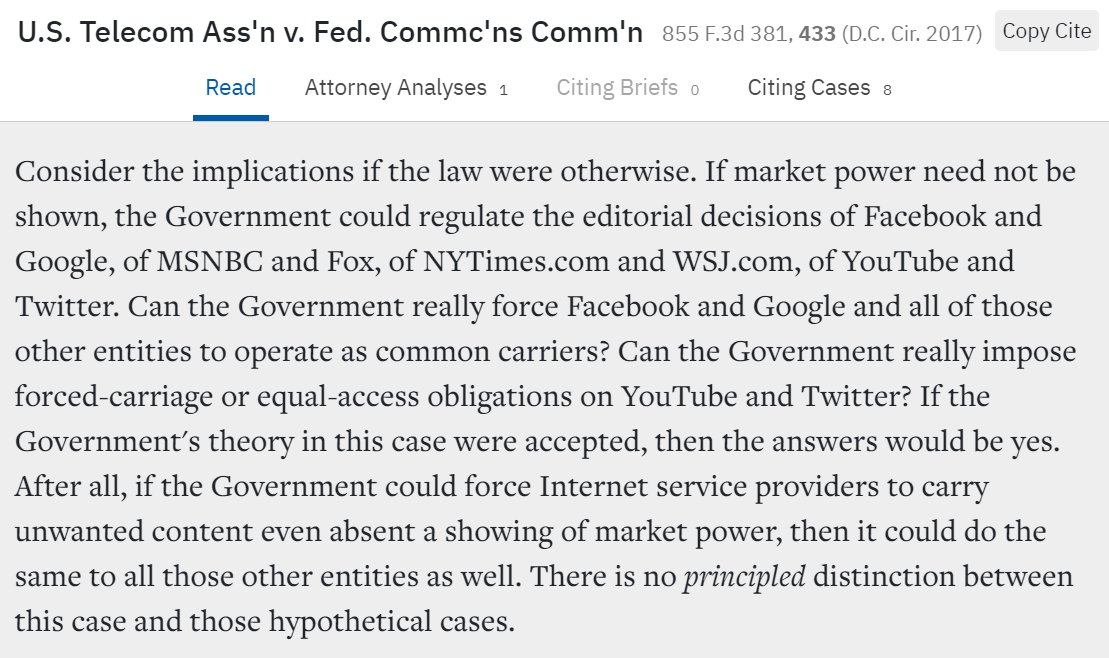
A tiny Idaho ISP has blocked Facebook & Twitter, citing complaints from its subscribers about their "censorship" of conservatives
At last we can see that the #NetNeutrality wouldn't have banned such blocking IF it were properly disclosed to consumers
Because the First Amendment
At last we can see that the #NetNeutrality wouldn't have banned such blocking IF it were properly disclosed to consumers
Because the First Amendment
https://twitter.com/blakereid/status/1349038156708892673
First, let's stipulate that what the ISP is doing is galaxy-brain-level insane
https://twitter.com/BerinSzoka/status/1348707092492939265
And let's note that they are about as fringey, as it gets, only serving a few rural communities with mostly wireless service
Their subscribers are some of the Trumpiest people in country
So this doesn't tell us anything about what the ISPs that serve nearly everyone will do
Their subscribers are some of the Trumpiest people in country
So this doesn't tell us anything about what the ISPs that serve nearly everyone will do

The FCC's 2015 & 2015 #netneutrality rules always applied only to ISPs that offered connectivity to "substantially all Internet endpoints"
The FCC never explained exactly what this would meant
The FCC never explained exactly what this would meant

But in 2017, the DC Circuit finally addressed this Q
A panel upheld the 2015 rules. The full court denied rehearing. Then-Judge Kavanaugh dissented, arguing the rules violated the First Amendment
Judges Srinivasan & Tatel, who wrote the panel decision explained why they didn't
A panel upheld the 2015 rules. The full court denied rehearing. Then-Judge Kavanaugh dissented, arguing the rules violated the First Amendment
Judges Srinivasan & Tatel, who wrote the panel decision explained why they didn't
To avoid First Amendment scrutiny, the FCC had banned blocking so long as you continued to provide access to "substantially all endpoints"
Srinivasan & Tatel chucked this approach and said what matters is whether ISPs "hold themselves out as neutral, indiscriminate conduits"
Srinivasan & Tatel chucked this approach and said what matters is whether ISPs "hold themselves out as neutral, indiscriminate conduits"

Srinivasan & Tatel didn't invent this concept. This has always been the core of what makes a company a common carrier: its representations to consumers
And that, in turn, is why common carriage regulation doesn't violate the First Amendment—to the extent it's chosen by carriers
And that, in turn, is why common carriage regulation doesn't violate the First Amendment—to the extent it's chosen by carriers
But the flipside of that test is that a company can opt-out of the FCC's #netneutrality rules (and also common carriage status) by changing the representations it makes to consumers to make clear that it will exercise editorial discretion over content
It's debatable whether Yourt1wifi has done that, and exactly how such a change in their terms of service would have to work (effective on next month's bill, etc) but they easily could do so
Srinivasan and Tatel didn't specifically analyze how an ISP could opt-out of the FCC's #netneutrality rules, but they made crystal clear that a company could do so—and that's why the rules didn't violate the First Amendment 

So in the end, all the FCC really achieved was a truth-in-marketing requirement that the FTC or any state AG could have enforced via consumer protection law
There was never any way to ban blocking of websites for political reasons, provided it was sufficiently disclosed
There was never any way to ban blocking of websites for political reasons, provided it was sufficiently disclosed
So it's time to stop pretending that the FCC's #netneutrality rules were "vital to democracy" or whatever
That doesn't mean #netneutrality isn't valuable, but that it's always been a question of ensuring that consumers get what they're promised
That doesn't mean #netneutrality isn't valuable, but that it's always been a question of ensuring that consumers get what they're promised
Yes, let's codify the 2015 "bright lines" rules because (a) there's never really been any disagreement about them, (b) ISPs have always been able to opt-out, and (c) we need legislation to resolve the fight over #TitleII
Here's the framework for a bill: internetsociety.org/resources/doc/…
Here's the framework for a bill: internetsociety.org/resources/doc/…
If anything, this incident should illustrate how stupid the #TitleII fight was: it doesn't change any of the above analysis. An ISP would have been subject to Title II only insofar as it didn't say it was going to block specific websites for political reasons.
Before anyone rushes to object, please actually read pp 389-93 of Srinivasan and Tatel's opinion:
casetext.com/case/us-teleco…
casetext.com/case/us-teleco…
Oh and don't miss Kavanaugh warning that #netneutrality regulation could lead to the govn't trying to impose neutrality requirements on social media websites—the very thing MAGA Republicans are now frothing at the mouth for 

Srinivasan and Tatel: lol no bro. Social media make clear that they ban certain content, while ISPs promise consumers exactly the opposite
This is why the right has drawn an utterly false equivalence between what it wants and net neutrality
This is why the right has drawn an utterly false equivalence between what it wants and net neutrality

In short, the First Amendment allow the gov't to enforce promises made to consumers (eg we offer you connectivity to the entire Internet without editorial intervention)
But the gov't can't second-guess how a social media site decides whether content violates its terms of service
But the gov't can't second-guess how a social media site decides whether content violates its terms of service
I explained this in detail in this recent paper: gaidigitalreport.com/2020/10/04/sec…
• • •
Missing some Tweet in this thread? You can try to
force a refresh






